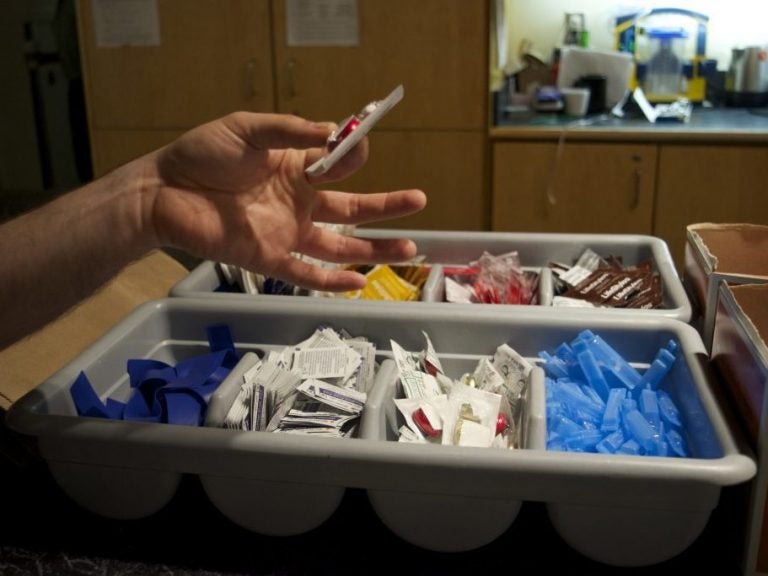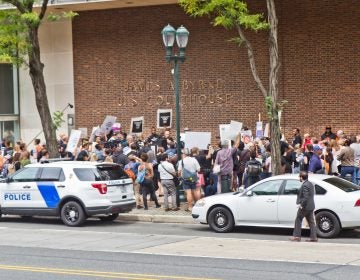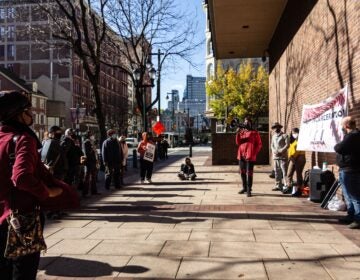If ‘crackhouse statute’ does not apply to injection sites, black community should sue
If the courts now say it’s legal to operate a drug house, black folks need to file a class-action lawsuit to get back what we lost when it was us.

Insite, Vancouver’s supervised injection facility, provides people with clean injection supplies. (Elana Gordon/WHYY)
When U.S. District Judge Gerald McHugh ruled that a proposal to open a safe injection site for people to use heroin under medical supervision does not violate federal law, I was flabbergasted. Then I was angry. Then I was resolute.
I took to the radio airwaves to make a simple claim: If it is legal to operate a drug facility when overdose victims are mostly white, black and brown people who had their property confiscated for running so-called drug houses during the crack era must be made whole.
In other words, it is time for black folks to file suit.
This is especially true in Philadelphia, where law enforcement agencies took more than $50 million in cash and thousands of homes and vehicles from those accused of drug-related crimes between 2002 and 2014. Many of the accused were black and brown people whose assets were taken in a veritable kangaroo court, where prosecutors operated without a judge, jury, or court reporter. Quite often, the accused didn’t even have lawyers.
A class-action lawsuit filed in connection with those forfeitures was recently settled, and the city agreed to repay just $3 million to those who had their property taken unjustly. But if Safehouse, the nonprofit behind the proposed safe injection site, is permitted to operate a place where people use illegal drugs, black folks who did the same thing must file suit again. Our communities must be made whole because even if the stated purpose of the proposed safe injection site is to stop overdoses, the federal law dealing with controlled substances does not differentiate between one drug use facility and another.
Don’t take my word for it, though. Look at what the law says. “It shall be unlawful to knowingly open, lease, rent, use, or maintain any place, whether permanently or temporarily, for the purpose of manufacturing, distributing, or using any controlled substance.”
Some say that law was only meant to apply to crack houses. That’s interesting since crack was widely considered a “black drug,” and as of 2017, nearly 80% of Americans dying from opioid overdoses were white.
And there’s the rub. Now that the victims are mostly white, there is a movement to normalize drug addiction and soften its consequences. There was no such concern for black people, and that’s why this whole thing is steeped in racism.
But just for the sake of argument, let’s say the judge is right, and it should now be legal to operate what many black folks see as a fancy drug house. Let’s say that the judge is also right when he says that bringing people into a place to use drugs is somehow intended to help them stop using.
If all that is true, we should immediately release every black person who ever ran a crack house. We should release every black person who was jailed for crimes related to their drug use. We should return the confiscated houses, cars, and cash of those who had their property taken under the Philadelphia District Attorney’s civil asset forfeiture program.
Bottom line, the law has not changed. The only thing that’s different is the complexion of those addicted to drugs. Therefore, if that same law allows white people to run a drug facility, black people should get back everything that was taken when crack was destroying our communities, separating our families, jailing our men and scarring our women.
And don’t tell us this is different because people are dying from opioid overdoses. Our whole community died from crack, and we still haven’t recovered.
The children of murdered dealers died emotionally. Once-proud neighborhoods died economically. The families of black people addicted to drugs died repeatedly because no one was there to catch us when we fell.
Therefore, if the courts now say it’s legal to operate a drug house, black folks need to file a class-action lawsuit to get back what we lost when it was us.
WHYY is your source for fact-based, in-depth journalism and information. As a nonprofit organization, we rely on financial support from readers like you. Please give today.





